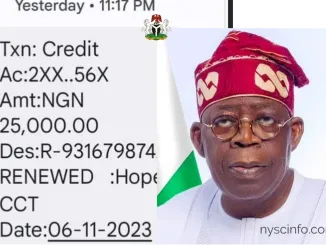How FG Disburse Conditional Cash Transfer
In a bid to combat poverty among vulnerable and low-income households, the Federal Government, through the National Social Investment Programmes Agency (NSIPA), has commenced the distribution of Conditional Cash Transfer (CCT). Halima Shehu, the newly appointed national coordinator and CEO of NSIPA, shared this information during her Senate screening.
Categories of Conditional Cash Transfer
Shehu outlined two categories of CCT, emphasizing its immediate relief and long-term empowerment components. The first category involves enrollees receiving ₦5,000 each as a form of immediate relief to support federal poverty alleviation efforts. The second category, named ‘livelihood,’ grants ₦150,000 to beneficiaries who undergo vocational training. This financial support aims to enable them to establish small or medium-scale businesses.
Government’s Commitment to Poverty Alleviation
Under President Bola Tinubu’s leadership, the federal government secured an $800 million loan from the World Bank, demonstrating its commitment to sustaining the conditional cash transfer scheme initiated by the previous administration. The comprehensive plan aims to provide ₦8,000 monthly to 12 million poor and low-income households across the country for a duration of six months.
All payments for the CCT initiative will be directly facilitated by the Central Bank of Nigeria into the beneficiaries’ bank accounts, ensuring transparency and accountability. To guarantee the proper use of funds, Shehu assured that no agency officials would be involved in handling the disbursed funds. The disbursement process will be closely supervised by development partners and the World Bank to maintain transparency.
Shehu highlighted that the disbursement process involves collaboration with payment service providers, who will meticulously reconcile payments to ensure accuracy. Even with the digitization of the conditional cash transfer program, a high level of transparency will be maintained, with monitors overseeing the entire process.
Shehu also discussed other government initiatives, including the N-Power empowerment program for graduates and non-graduates, enterprise empowerment programs targeting small and medium-scale entrepreneurs, and the Homegrown school feeding program providing meals to pupils in public schools from primary one to primary three during school sessions.
The government’s multi-faceted approach, combining immediate relief through conditional cash transfer and long-term economic empowerment, reflects its commitment to addressing poverty at its roots. The structured disbursement process and collaboration with international partners ensure accountability and transparency in these poverty-alleviation initiatives.



















